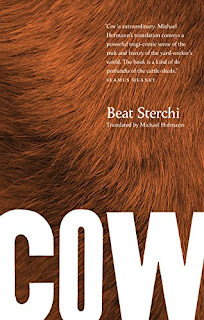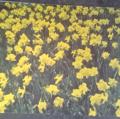Stephanie Jane recenzis Cow de Beat Sterchi
An insightful portrayal
5 steloj
It was a surprise for me to realise that this novel was originally published thirty-five years ago. Its themes and subjects are so completely relevant now! Sterchi explores xenophobia towards migrant workers and also the way in which we treat - and mistreat - the animals we raise for our food. For anyone whose plantbased living commitment is wavering, Cow is a powerful read to set you right back on track. Cow begins as Spanish cow-hand Ambrosio arrives in the rural Swiss idyll of Innenwald. Small farms raise contented cows, pigs and hens the old-fashioned way; the village makes its own cheeses and hams. It should be bliss. But the villagers, almost without exception, are suspicious of the new outsider and side together to close him out. Why should a Spaniard be given a Swiss job (even though there is no local person out of work). We soon see that …
It was a surprise for me to realise that this novel was originally published thirty-five years ago. Its themes and subjects are so completely relevant now! Sterchi explores xenophobia towards migrant workers and also the way in which we treat - and mistreat - the animals we raise for our food. For anyone whose plantbased living commitment is wavering, Cow is a powerful read to set you right back on track. Cow begins as Spanish cow-hand Ambrosio arrives in the rural Swiss idyll of Innenwald. Small farms raise contented cows, pigs and hens the old-fashioned way; the village makes its own cheeses and hams. It should be bliss. But the villagers, almost without exception, are suspicious of the new outsider and side together to close him out. Why should a Spaniard be given a Swiss job (even though there is no local person out of work). We soon see that local labour isn't the only issue dividing Innenwald. Several of the farms have installed new-fangled milking machines instead of milking by hand. And they are starting to buy in chemicals instead of spreading dung from their own cows. It's so much quicker - more modern and efficient. Cow jumps in time between the Knuchel farm where the family is still staunchly committed to gentle but labour-intensive methods, and a nearby town abbatoir where Ambrosio is working some seven years later. We know he loses his farm job but don't immediately know how, and we soon see that the Knuchel farm must have been lost to modernity too. The abattoir scenes are powerful. The violence of slaughter and butchery is casually (and I believe accurately) portrayed which left me with memorable impressions of how food animals are killed and processed. It is something I think we should all be aware of, especially people who eat meat, but this subject is usually coyly hidden from public view. Sterchi portrays the abattoir workers realistically and sensitively. I liked the chapters where we are in the midst of their gossip and chatter. These are not innately cruel men, but men forced into inhumane actions in order to keep their jobs. I was, strangely, reminded of Harriette Arnow's The Dollmaker while reading Cow. In that book a rural American family is sucked into the hell of industrial Detroit between the wars. In this book, the respectful farming of generations is cast aside for the same ideal of industralisation as a universal answer. Speed, quantity and profit over humanity and health. I suspect many readers will shy away from Cow, preferring to remain ignorant about our mass produced food supply. However I would recommend this book widely. It is, in itself, simply a very good story and an engrossing read. It is also a insightful portrayal of a way of farming which isn't quite completely lost to us and which, I think, until livestock farming is completely obsolete, desperately needs to become widespread again.

